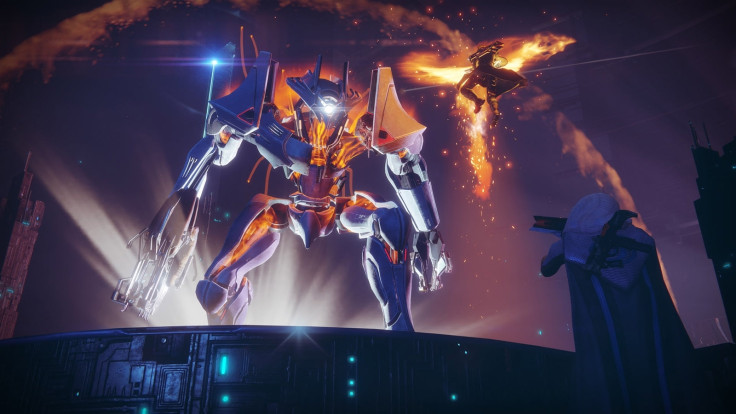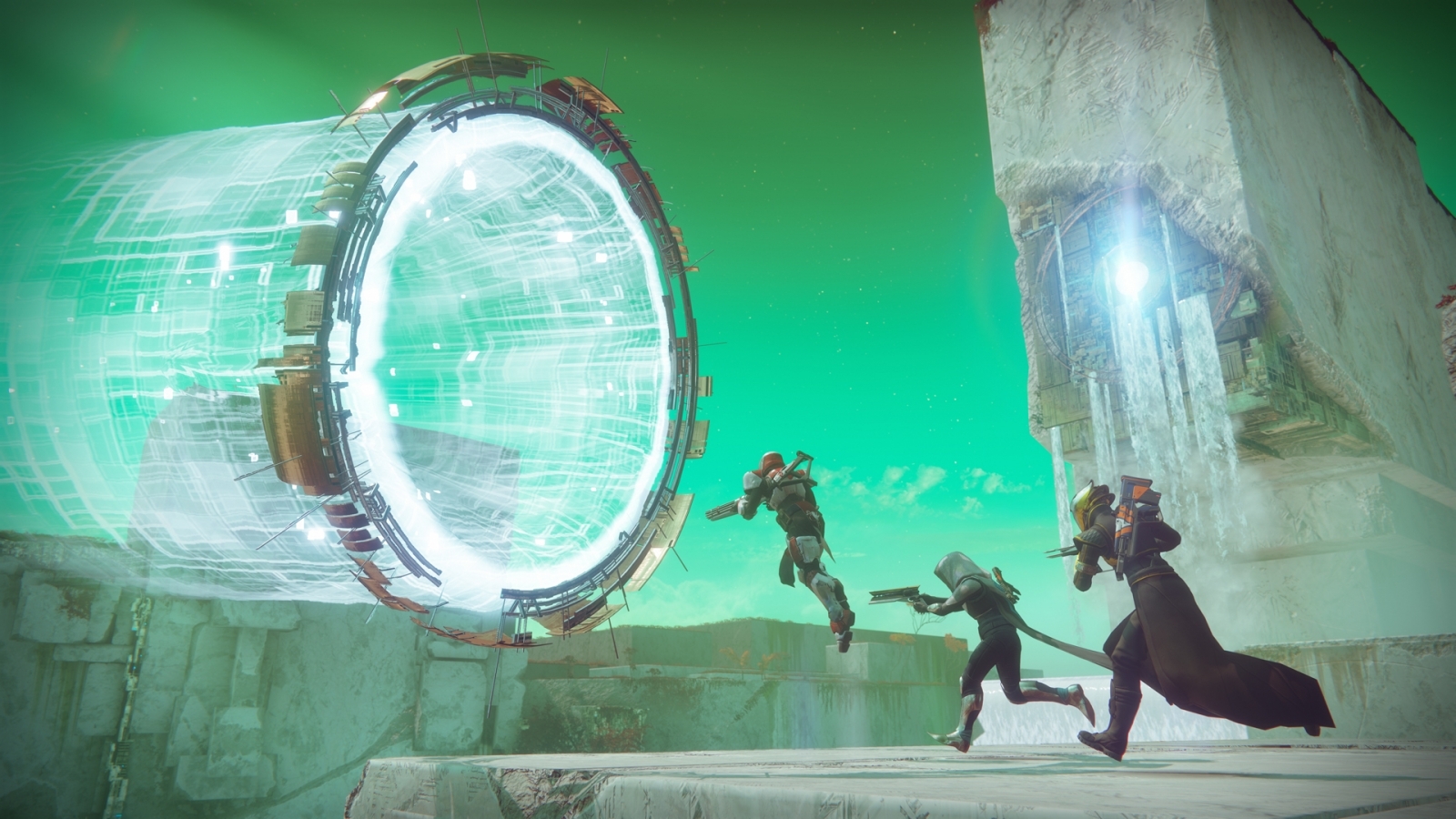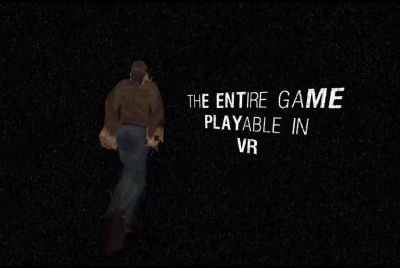Destiny 2 review: Bungie's unique online shooter returns as a towering success
Fight across the solar system, popping alien heads in the pursuit of that all-important loot.
Destiny 2
Platforms: PS4, Xbox One, PC
Developer: Bungie
Publisher: Activision
Release Date: Out Now / PC Version: 24 October
For all its qualities and successes, Destiny was defined more by what it could have been than what it was. In 2014, millions of players instantly bought into what Bungie was trying to achieve with this huge online role-playing shooter, but the hints at its true potential were few and far between.
Threadbare at launch, the game told a story that was decidedly bland for the team that brought the world Halo and many of its sequels. This was a problem, but Bungie's industry-best gunplay drew an audience regardless, and soon people learnt that Destiny's real joy was to be found not just in how it played, but what it offered after the credits rolled.
Destiny casts players as Guardians - basically science fiction knights - able to wield powers derived from the 'Light': an energy source granted to them by an enormous, mysterious object hanging dormant above Earth's Last City.
This huge sphere is called the Traveller, and it once granted humanity the technological means to branch out into the solar system, creating a golden age for our civilisation. However, in a mysterious but devastating attack long before the original game took place, this prosperous existence collapsed. Bungie created a world that was rich in this kind of backstory, which gave meaning to the warring alien factions scattered across the now-derelict solar system. The actual story players experienced didn't convey this well enough however, leaving the best details in unlockable texts on Bungie's website.
Players journeyed across the stars killing enemies that were never really defined then running up to various terminals to hold a button allowing your robot companion - called a Ghost - to scan them. This, repeated, was the bulk of the early game, and it just wasn't engaging. There was much more to Destiny than its story, but without that reason to initially invest the rest didn't quite fall into place.
With each expansion the game improved on these areas, but creating a gripping world remained a concern of Bungie's the team needed to address in the inevitable sequel. Which brings us to Destiny 2.

Three years and four expansions on from the original game, Bungie's sequel shows clearly all that the studio has learnt from the often turbulent development of the series to date. First and foremost, it tells a story that's exciting, dramatic and engaging, immediately drawing in players while reintroducing what the game is about.
The Red Legion - a faction of the Cabal species led by the imposing Dominus Ghaul - has invaded Earth, devastating The Last City in pursuit of the Traveller and the Light it possesses. As humanity flees, Ghaul is successful in his attempt to ensnare the mysterious object, crippling it in the process and causing each Guardian to lose their powers, and their ability to be brought back to life. Humanity's protectors are left scattered across the solar system, dealing with their rediscovered mortality without hope or a plan for retaliation.
Things start well with juxtaposing missions first showing players all a Guardian is capable of, then taking that power away to emphasise the journey ahead. Once players have their Light back, thanks to a shard of the Traveller discovered in Europe, the fightback begins and they embark to the game's four key areas.
Starting on Earth - in the European Dead Zone - players then travel to Titan, Io and Nessus to find and unite the Guardians' leadership. Each location offers a large open space littered with things to do, from simple patrols to standard missions and public events that bring local players together for battles based around a variety of limited-time set pieces.
By the time you reach Io the game loses a lot of the momentum it had built up over a string of quality missions, and things start to noticeably sag, before picking up again as the ending nears. It may rip off Star Wars, but Destiny 2's finale is spectacular, memorable and reminiscent of the soaring glories of Halo's greatest set pieces. That second act lull is short-lived, but so is the whole campaign. Players can complete the story within around five hours, but given the wealth of additional missions and tasks to embark upon, most will not.
Even so, I'd have preferred a campaign that did more to weave these side activities into the story, rather than making them seem like distractions from more pressing matters. It's a classic problem games of this size and freedom encounter, and the result in this case is a game that feels like it's in a rush to get to the end. For most games, an ending isn't something to hurry toward, but for Destiny the coda feels like the real game, making the story merely a marketable means of getting there.
Playing and replaying everything Destiny has to offer is the crux of its endgame. It isn't for everyone, but Bungie has done a lot in this sequel to mitigate a sense of grinding repetitiveness that marred its predecessor.




Progression entirely revolves around the items players find and obtain through play. By the time players complete the game's story they'll have reached the level 20 cap, after which the traditional levelling system is replaced by a different system.
Each item players can equip has a power stat that attributes to an overall power level which in turn unlocks events and difficulty modes. These items are attained through the collection of 'engrams' dropped by enemies, found in crates or unlocked through the completion of challenges. These engrams are Destiny's loot boxes, with uncommon, rare, legendary and exotic variations telling you how rare the item within will be, whether it's a weapon or piece of armour.
Guardians collect engrams from anything and everything, with Strikes and Raids offering the greatest challenge and in turn, the best rewards. The competitive, player-versus-player Crucible also rewards players, but in this mode power is evened out to ensure a somewhat level playing field.
The constant pursuit of rarer, more powerful items creates the loop that has made Destiny such an enduring success, and in Destiny 2 Bungie has streamlined it to create much a more enjoyable and cohesive experience, with an even greater depth.
This loop is underpinned by core shooter mechanics that are simply perfect. It's a little odd that I'm only now bringing up how the game actually plays moment-to-moment, but that's only because Bungie are so well versed, so adept at crafting first-person shooters that there's not much to do other than to sing this talented team's praises.
Bungie has balanced challenge with empowerment across an enormous arsenal of armaments players will use to wipe out hundreds of enemies, each requiring different strategies and approaches. Popping a Cabal head might be the most satisfying second in gaming, or perhaps its seeing a Fallen's soul leave its body, or maybe it's a well-timed headshot causing an enemy to explode and wipe out his pals.
Bungie has been making shooters for the best part of two decades, and that experience is evident. The team's veteran status ensures the utmost quality in this area, and many others, so it's no surprise Destiny 2 also has the presentation to match its exquisite play. Visually the sequel is much more arresting than the original, with a larger colour palette and more memorable vistas capturing the mystery of great science fiction.
Michael Salvatori, Skye Lewin, C Paul Johnson and Pieter A Schlosser's soaring soundtrack complements these wonderful sights too, just as well as it complements the thrilling moments of explosive battle throughout.
Bungie has made strides when it comes to Destiny's story telling, but has yet to strike the right balance between what happens before and after the credits. While the campaign has been vastly improved, it is short-lived, with an apparent eagerness on the part of the developers for everyone playing to get to what it believes to be real game being sold here. Whether or not that's the case, Bungie should serve both Destiny's story and endgame with equal enthusiasm. That all said, Destiny 2 is undoubtedly one of the best shooters on the market, with a unique hook that has been streamlined to keep players engaged for months and years ahead, and underpinning mechanics that make every moment a blast. This is a sequel that refines a formula rather than shaking it up, and while that does the job for now, the focus will soon shift to what Bungie can do to keep Destiny moving forward.
© Copyright IBTimes 2025. All rights reserved.




















